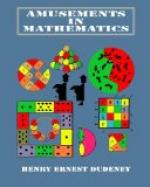120.—THE FARMER AND HIS SHEEP.
[Illustration]
Farmer Longmore had a curious aptitude for arithmetic, and was known in his district as the “mathematical farmer.” The new vicar was not aware of this fact when, meeting his worthy parishioner one day in the lane, he asked him in the course of a short conversation, “Now, how many sheep have you altogether?” He was therefore rather surprised at Longmore’s answer, which was as follows: “You can divide my sheep into two different parts, so that the difference between the two numbers is the same as the difference between their squares. Maybe, Mr. Parson, you will like to work out the little sum for yourself.”
Can the reader say just how many sheep the farmer had? Supposing he had possessed only twenty sheep, and he divided them into the two parts 12 and 8. Now, the difference between their squares, 144 and 64, is 80. So that will not do, for 4 and 80 are certainly not the same. If you can find numbers that work out correctly, you will know exactly how many sheep Farmer Longmore owned.
121.—HEADS OR TAILS.
Crooks, an inveterate gambler, at Goodwood recently said to a friend, “I’ll bet you half the money in my pocket on the toss of a coin—heads I win, tails I lose.” The coin was tossed and the money handed over. He repeated the offer again and again, each time betting half the money then in his possession. We are not told how long the game went on, or how many times the coin was tossed, but this we know, that the number of times that Crooks lost was exactly equal to the number of times that he won. Now, did he gain or lose by this little venture?
122.—THE SEE-SAW PUZZLE.
Necessity is, indeed, the mother of invention. I was amused the other day in watching a boy who wanted to play see-saw and, in his failure to find another child to share the sport with him, had been driven back upon the ingenious resort of tying a number of bricks to one end of the plank to balance his weight at the other.
As a matter of fact, he just balanced against sixteen bricks, when these were fixed to the short end of plank, but if he fixed them to the long end of plank he only needed eleven as balance.
Now, what was that boy’s weight, if a brick weighs equal to a three-quarter brick and three-quarters of a pound?
123.—A LEGAL DIFFICULTY.
“A client of mine,” said a lawyer, “was on the point of death when his wife was about to present him with a child. I drew up his will, in which he settled two-thirds of his estate upon his son (if it should happen to be a boy) and one-third on the mother. But if the child should be a girl, then two-thirds of the estate should go to the mother and one-third to the daughter. As a matter of fact, after his death twins were born—a boy and a girl. A very nice point then arose. How was the estate to be equitably divided among the three in the closest possible accordance with the spirit of the dead man’s will?”




